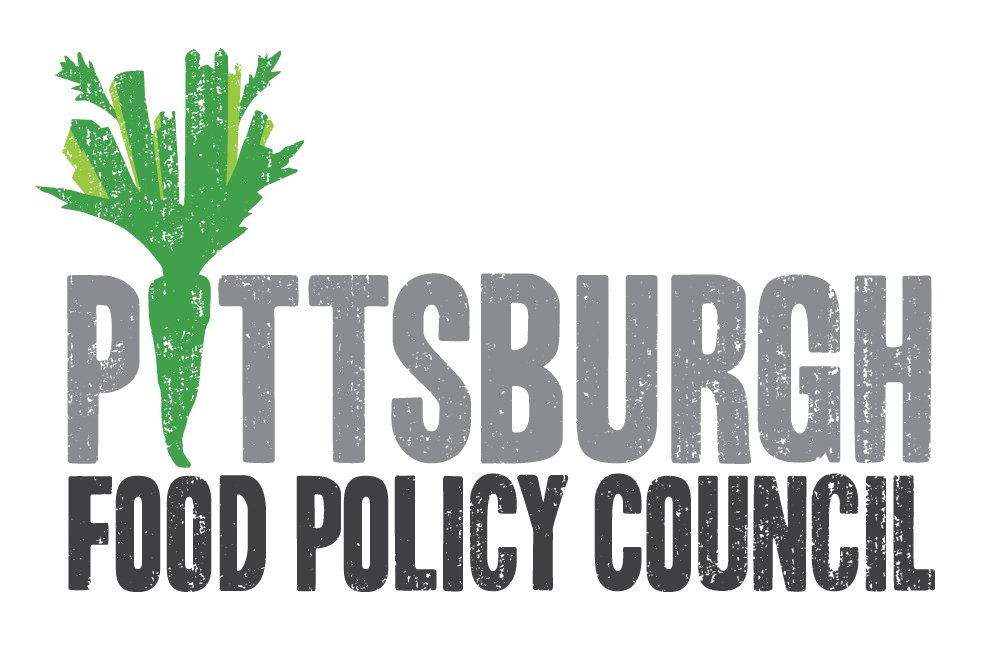GOOD FOOD PURCHASING POLICY
-
GOOD FOOD PURCHASING POLICY -
The Good Food Purchasing Policy (GFPP) was created by the Center for Good Food Purchasing. The policy helps institutions prioritize healthy, sustainable, regional, and fair foods in their purchasing contracts. The Pittsburgh Food Policy Council is working with Pittsburgh Public Schools and other community partners to create, promote and help implement a “Good Food Purchasing Policy” in the district.
The five fundamental values of the GFPP are outlined below. Agencies and institutions commit to including language that promotes these values in their food contracts by adopting a purchasing policy. Once the policy is adopted, agencies and institutions work with the Center for Good Food Purchasing, community members, and the local coalition to implement the proposed changes, track progress, and celebrate success.
Nutrition: Promote health and well-being by offering generous portions of vegetables, fruit, whole grains, and minimally processed foods, while reducing salt, added sugars, saturated fats, and red meat consumption and eliminating artificial additives. Improving equity, affordability, accessibility, and consumption of high-quality, culturally relevant Good Food in all communities is central to advancing Good Food purchasing practices.
Environmental sustainability: Sourced from producers that employ sustainable production systems to reduce or eliminate synthetic pesticides and fertilizers; avoid the use of hormones, routine antibiotics, and genetic engineering; conserve and regenerate soil and water; protect and enhance wildlife habitats and biodiversity; and reduce on-farm energy and water consumption, food waste and greenhouse gas emissions. Reduce menu items that have high carbon and water footprints, using strategies such as plant-forward menus that feature smaller portions of animal proteins in a supporting role. Examples of certifications and claims include USDA Organic, Animal Welfare Approved, Antibiotic Resistance Action Center Certified Responsible, Demeter Certified Biodynamic, American Grassfed, Seafood Watch, the Marine Stewardship Council, Food Alliance Certified, and Protected Harvest Certified Sustainable.
Regional economies: Support diverse, family and cooperatively owned, small and mid-sized agricultural and food processing operations within the local area or region.
Valued workforce: Sourced from producers and vendors that provide safe and healthy working conditions and fair compensation for all food chain workers and producers from production to consumption. Examples of certifications and claims include Food Justice Certified, the Equitable Food Initiative, Fair For Life, the US Federation of Worker Cooperatives, and the United Farm Workers.
Animal welfare: Sourced from producers that provide healthy and humane conditions for farm animals. Examples of certifications and claims include USDA Organic, American Grassfed, Certified Humane, Animal Welfare Approved, the Global Animal Partnership, American Humane Certified, 100% Grass-Fed, and Certified Grassfed by A Greener World.
The Good Food Purchasing Coalition includes:
Pittsburgh Food Policy Council
Pittsburgh Public Schools
Pittsburgh parents
Center for Good Food Purchasing
Allegheny County Health Department (REACH)
UPMC Children’s Hospital
Adagio Health
PPS Food Service Department
Imagine PPS
PPS Obama 6-8
Pasa Sustainable Agriculture
Humane Action Pittsburgh.
NEXT STEPS:
Draft policy language with the help of the Pittsburgh Good Food Purchasing Coalition.
Submit policy language to school board directors and food service director for review
Advocate for policy adoption via community input process
Co-sponsor School Board candidate forum in partnership with Vote School Board First
WAYS TO GET INVOLVED:
Involvement interest form - Want to get involved in the coalition? Fill out our interest form here.
Monthly coalition meetings - The Good Food Pittsburgh Coalition coalition meets on the second Monday of each month from 1 - 2:30 PM. If you have additional questions, please contact Sarah Buranskas with any questions at sarah@pittsburghfoodpolicy.org.
February information session - Watch our Zoom information session here.

